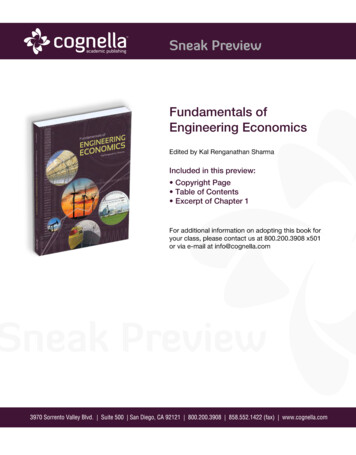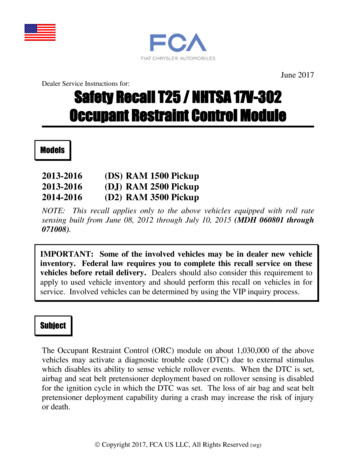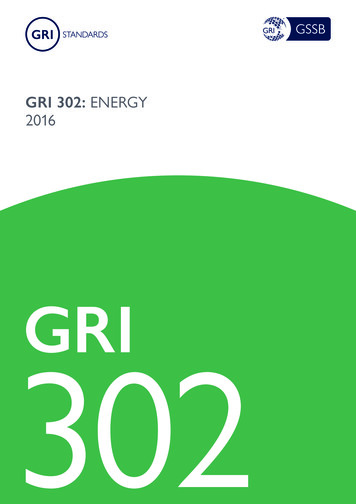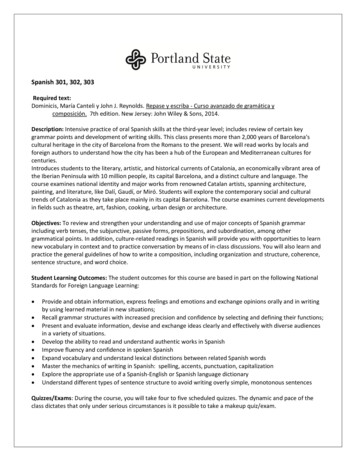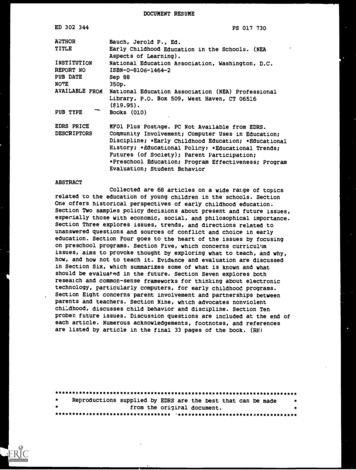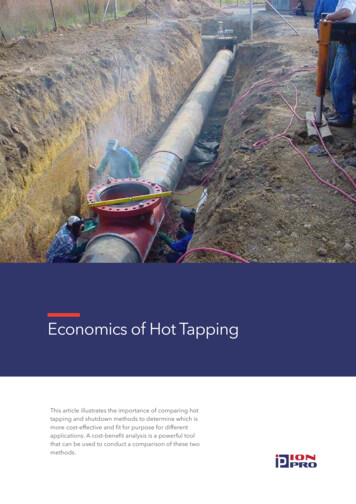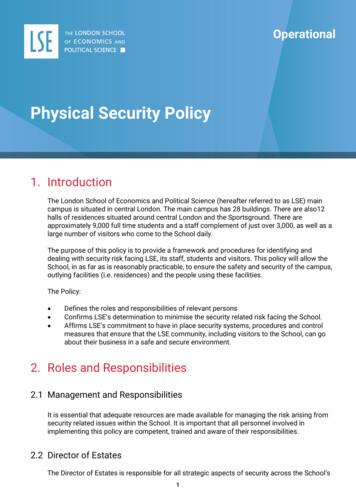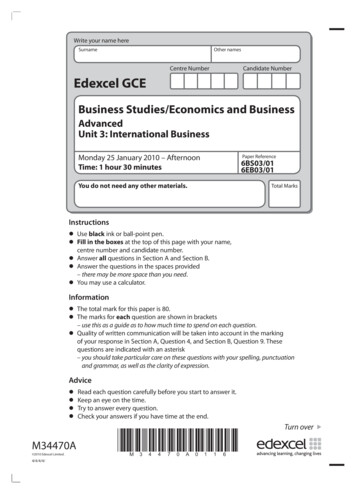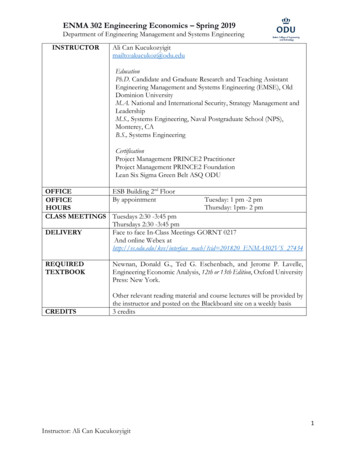
Transcription
ENMA 302 Engineering Economics – Spring 2019Department of Engineering Management and Systems EngineeringINSTRUCTORAli Can Kucukozyigitmailto:akucukoz@odu.eduEducationPh.D. Candidate and Graduate Research and Teaching AssistantEngineering Management and Systems Engineering (EMSE), OldDominion UniversityM.A. National and International Security, Strategy Management andLeadershipM.S., Systems Engineering, Naval Postgraduate School (NPS),Monterey, CAB.S., Systems EngineeringCertificationProject Management PRINCE2 PractitionerProject Management PRINCE2 FoundationLean Six Sigma Green Belt ASQ ODUOFFICEESB Building 2nd FloorBy appointmentTuesday: 1 pm -2 pmOFFICEThursday: 1pm- 2 pmHOURSCLASS MEETINGS Tuesdays 2:30 -3:45 pmThursdays 2:30 -3:45 pmDELIVERYFace to face In-Class Meetings GORNT 0217And online Webex athttp://vs.odu.edu/kvs/interface reach/?cid 201820 ENMA302VS 27434REQUIREDTEXTBOOKCREDITSNewnan, Donald G., Ted G. Eschenbach, and Jerome P. Lavelle,Engineering Economic Analysis, 12th or 13th Edition, Oxford UniversityPress: New York.Other relevant reading material and course lectures will be provided bythe instructor and posted on the Blackboard site on a weekly basis3 credits1Instructor: Ali Can Kucukozyigit
ENMA 302 Engineering Economics – Spring 2019Department of Engineering Management and Systems EngineeringCOURSE DESCRIPTION:Introduction to cost estimation, accounting and financial metrics. Valuation techniques, time value ofmoney, and cash flow analysis. Economic analysis of engineering alternatives including depreciationeffects, income taxes, inflation, engineering management capital budgeting of projects, portfolio andpublic sector projects.Preferred student background – At least one introductory course in accounting, finance, or economicsplus the introduction to statistics required by your department. Each student will need skills in orneed to build skills in creating Microsoft Excel workbooks using cell referencing and financial andstatistical functions.COURSE OBJECTIVESThe academic aims of the course are to: Provide students with the fundamentals of the economic analysis of engineering projectsincluding set up and analysis in Microsoft Excel.Introduce students to the capstone problems of incremental and replacement analyses andrationing capital among competing projects.Provide students with the skills necessary to manage the economic aspects of small to mediumsized projects as an entry level engineer.Build up skills in the use of fundamental concepts in economicsCOURSE APPROACH:This course will be conducted as live sessions at the scheduled days/times and place. There may beoff-line sessions where class will not meet live but students will instead accomplish course-relatedactivities on their own. Archived recordings of class sessions may be made available at the discretionof the instructor and are not meant to replace attending the live sessions. Blackboard will be the maincommunication platform for any course material (lectures slides, home works and assignments,announcement). The course utilizes a set of learning and teaching activities that include: Lectures by the instructor (and/or expert guest lecturer)In-class and/or blackboard discussions around basic concepts, tools and techniquesRelated weekly readingsWeekly lecture slidesWriting and presentations by studentsThe course format is interactive lecture with student participation in question and answer sessions andsolution of example homework problems. Homework will be assigned each week, but not collectedor graded, only submission will be required. Solutions to selected homework problems from the priorweek’s lecture will be reviewed during the beginning of each class. One or two students are expectedto volunteer for presenting their solution to a problem, and then collectively the class will discuss thesolutions for the selected problem. After this review, the solutions for each chapter’s assigned2Instructor: Ali Can Kucukozyigit
ENMA 302 Engineering Economics – Spring 2019Department of Engineering Management and Systems Engineeringproblems will be posted on the course blackboard for students to download and keep for further studyand reference.COURSE REQUIREMENTS:The following requirements are considered necessary to successfully complete the course:Homework assignments: Homework is provided for learning purposes and keeping up with the tempo ofthe class. Solutions to homework problems will be provided after the submission deadline.Submission of the homework problem is required but not all evaluated. A typical one will be discussedin the classroom. Completion of the homework is strongly recommended as it will likely be difficultto complete the exams if you are not familiar with the problems. Extra points may be awarded as anincentive for complete submission of all homework assignments and participation in class. Allassignments must be submitted to blackboard, the final exam will be performed online again on theblackboard.Blogs: Students are expected to contribute to the blog or discussion topics assigned by the instructor.This contributions will be automatically graded by blackboard.Three progress examinations: Multiple choice questions administered via Blackboard, 20 questions each.Weight - 20 points each of total grade. Check the course schedule for tentative dates.Final examination: Take-home project. Weight - 30 points of total grade. Each student’s work will betheir own; no working together, sharing, copying prior or current student’s workbooks, etc. Check thecourse schedule for tentative dates.1) Due Weekly:1- Class attendance, weekly participation on blackboard blogs and discussionsprior to due dates (5%)2- Weekly assigned homework submissions (5%) [submission only- no grades]3- Participation in the class and homework volunteering (extra bonus 5%)2) Assigned Dates:Examination 1 due on 02/12/2019 [%15]Examination 2 due on 03/07/2019 [%20]Examination 3 due on 04/09/2019 [%25]Final Examination due on 05/02/2019 [%30]GRADE SCALE:AA-B BB-C CC-D100-93 92,9-90 89,9-87 86,9-82 81,9-80 79,9-77 76,9-72 71,9-70 64-69.93Instructor: Ali Can Kucukozyigit
ENMA 302 Engineering Economics – Spring 2019Department of Engineering Management and Systems EngineeringCOURSE CONDUCT POLICIES1. Attendance is of great importance and is expected by the instructor as well as the university policy.It is the student’s responsibility to inform the instructor of any session that will be missed and tocoordinate necessary activities to make- up for the missed session. In-class and online records willbe collected every class session.2. The Blackboard Learning System [http://www.blackboard.odu.edu/] will be utilized forannouncements, posting of slide presentations and reports, and discussion topics for groups.3. Improve your WebEx skills and check your connection, audio and camera prior to the class.Contact distant learning technicians if you need to.4. Checking the course blackboard platform should be the first step in preparing for class. Everyone musthave an ODU email account, and should check the course website for announcements, throughBlackboard, before each session.5. Students should have read all assigned materials prior to going to class. The textbook will be the primarysource for homework and your individual studies about the course content. Slide presentation willbe provided prior to a session for perusal by students. The case studies and discussions duringclass are aimed at clarifying and reinforcing important topics, and will definitely increase studentsuccess.6. Preparedness; Students should be prepared to share prior experiences (team projects or workexperience) and analysis of independent readings on related subject matter. Be prepared, payattention, share and speak up politely and in confidence. Not being prepared is not acceptable!7. Due date policy; All assignments must be submitted electronically on Blackboard by 23:59 of the duedate stipulated on Blackboard unless the instructor has authorized a revised due date for thestudent assignment, prior to the submission date.8. Late submission of requirements will only be accepted with prior coordination with the instructorand getting approval. All late submissions are subject to a 5% deduction in points per calendar daylate. Submission over 5 calendar days late will automatically get zero “0” points.9. Please plan and notify akucukoz@odu.edu in advance of the deadline in case you cannot submityour assignment on time for any reason. It is the individual responsibility of the student to meetany due dates, there will be no reminders posted to Blackboard or sent via emails.10. Email communications: Email is the primary mean of individual communications. In order to facilitatethis, please always lead the e-mail subject line with “ENMA302” followed by a descriptive subjectline (e.g., “ENMA302 question about the assignment”).11. Academic integrity; The Old Dominion University Honor System is in effect for all student worksubmitted during the course. ODU never expect or tolerate any lying, cheating, and plagiarism areviolations of the Honor System, and are subject for disciplinary action.12. Diversity; The Old Dominion University respects all the students with all diverse backgrounds. Alldiverse backgrounds and perspectives be well served in my course. If any of you have anyconcern/conflicts rising out of being diverse, please let me know so that we can work it out foryou. It is important for me that you take the most out of my class and also enjoy, so if you alreadyhave established accommodations please convey it to me at your earliest convenience so we candiscuss your specific needs in private.13. Discrimination or Harassment; None and never allowed. Engineering professionalism and basichuman civility and mutual respect are expected. Reference the ODU catalog.4Instructor: Ali Can Kucukozyigit
ENMA 302 Engineering Economics – Spring 2019Department of Engineering Management and Systems Engineering14. Use of Electronics Devices; the use of personal electronic devices are allowed in the class to be usedfor course related use. Any use of electronics (including cell phones) that leads to disturbance ofclass conduct and instructor focus is not permitted.15. WebEx Conference Connection: Students participating in the course via the WebEx/Adobe Connectmedium are expected to have an adequate microphone connection and be capable of orallyparticipating in class discussions. “Lurking” (viewing a web-based forum without contributinganything) is not considered as participation. Everyone in the class has something to add, andcontribute so join in!16. Submission requirements for Homework and Examinations: Work will be evaluated based on your abilityto demonstrate understanding of the concepts as well as the correct solution. All work must besubmitted in electronic format (MS Office or PDF), Spreadsheets and charts should be legiblypasted into documents17. Excuse and absences about due dates of work submissions must be coordinated with the instructorbefore the class or due date to prevent late submission point deductions. Submissions will not beaccepted once the solution is posted on Blackboard for the student review and self-study.COURSE SCHEDULE AND TOPICS:Week11DateTopic01/15/2019 Welcome and Course Design Syllabus Overview01/17/2019 Making Economic DecisionReadingsLecture SlidesChapter 1Engineering Economics Overview201/22/2019 Engineering Costs and Cost EstimatingChapter 2201/24/2019 Accounting and Engineering EconomyChapter 17301/28/2019 Interest and EquivalenceChapter 3301/31/2019 Equivalence Repeated Cash FlowsChapter 4402/05/2019 Equivalence Repeated Cash FlowsChapter 4402/07/2019 Review for Examination 1502/12/2019 Examination 1 -No Class-Examination 1502/14/2019 Present Worth AnalysisChapter 5602/19/2019 Annual Cash Flow AnalysisChapter 6602/21/2019 Rate of Return AnalysisChapter 75Instructor: Ali Can Kucukozyigit
ENMA 302 Engineering Economics – Spring 2019Department of Engineering Management and Systems Engineering702/26/2019 Rate of Return AnalysisChapter 7Incremental Analysis702/28/2019 Other Analysis TechniquesChapter 8803/05/2019 Review for Examination 2803/07/2019 Examination 2-No Class-Examination 2903/12/2019 -No Classes-Spring Holiday No Classes903/14/2019 -No Classes-Spring Holiday No Classes1003/19/2019 DepreciationChapter 111103/21/2019 Income TaxesChapter 121203/26/2019 Inflation and Price ChangeChapter 141203/28/2019 Replacement AnalysisChapter 131304/02/2019 Replacement AnalysisChapter 131304/04/2019 Review for Examination 31404/09/2019 Examination 3-No Class-Examination 31404/11/2019 Uncertainty in Future Events and RiskChapter 101504/16/2019 Rationing Capital Among Competing Projects Chapter 171504/18/2019 Selection of Minimum Attractive Rate ofReturn (MARR)Chapter 151604/23/2019 Economic Analysis in the Public SectorChapter 161604/25/2019 MS Excel Spreadsheets in Economic Analysis Lectures and self-study1704/30/2019 Review for Final Exam and Course Wrap Up1705/02/2019 Final Examination SubmissionCOURSE DISCLAIMER:Every attempt is made by the instructor to provide a syllabus that is complete, comprehensive and thatprovides an accurate overview of the course. However, circumstances (e.g. conflict of schedule, cancellationof classes due to weather or other reasons) may make it necessary for the instructor to modify the syllabusduring the semester. This may also depend, in part, on the progress, needs, and experiences of the studentsattending the class.6Instructor: Ali Can Kucukozyigit
WebEx Conference Connection: Students participating in the course via the WebEx/Adobe Connect medium are expected to have an adequate microphone connection and be capable of orally participating in class discussions. “Lurking” (viewing a web-based forum without c

